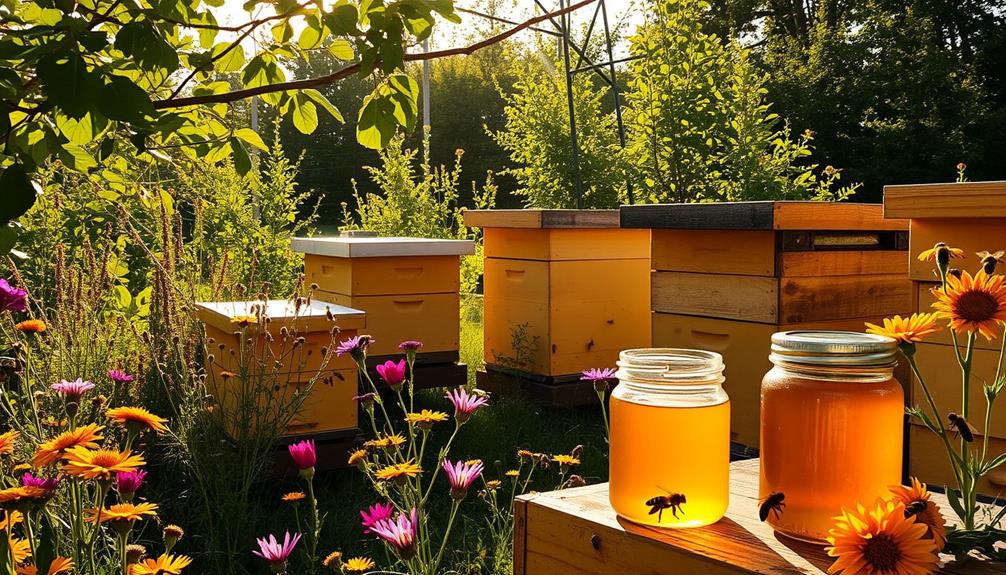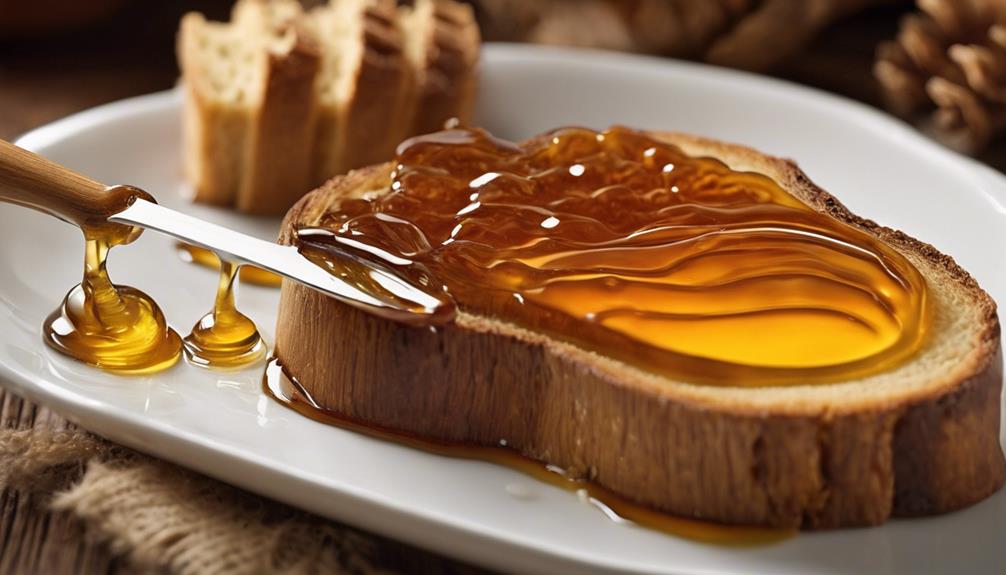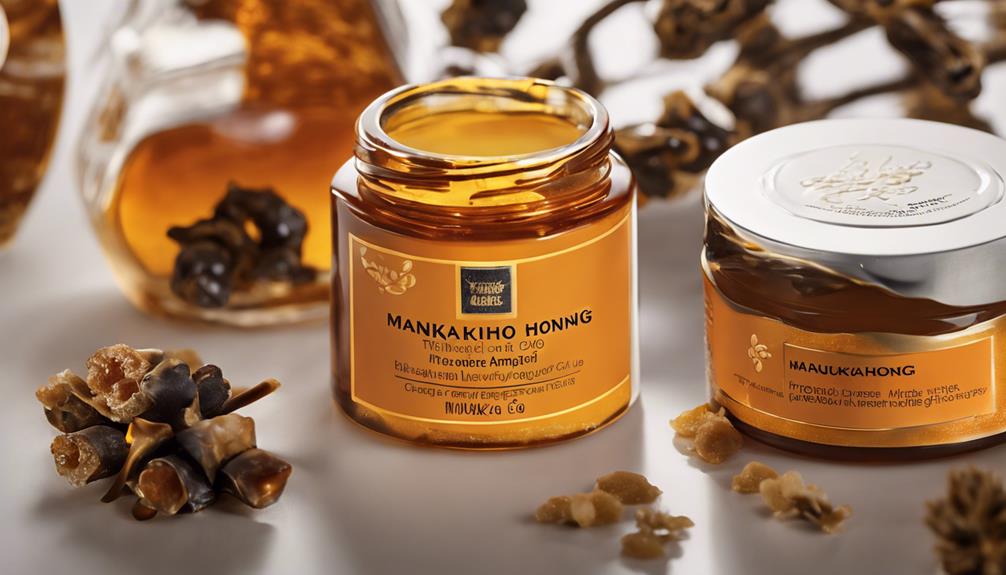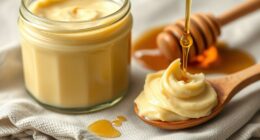Honey's natural properties make it an effective preservative. Its low moisture content and high sugar concentration inhibit microbial growth, while its acidity and hydrogen peroxide boost its antimicrobial abilities. You've likely noticed ancient civilizations relied on honey for preserving food. You can use honey to store fruits or enhance savory sauces and desserts. Different varieties of honey offer varying pH levels that can impact preservation effectiveness. To get the best results, you'll want to guarantee your honey is pure and high-quality. There's so much more to discover about honey's incredible versatility and its culinary benefits.
Key Takeaways
- Honey's low moisture content and high sugar concentration create an environment that inhibits microbial growth, making it an effective natural preservative.
- Its natural acidity and hydrogen peroxide content enhance its antimicrobial properties, providing additional protection against spoilage.
- Historical experiments show that ancient civilizations effectively utilized honey for food preservation, underscoring its long-standing efficacy.
- Short-term preservation methods include storing fruits in honey, which leverages its osmotic effect to dehydrate and preserve produce.
- Quality honey, free from additives, retains nutrients and enhances preservation capabilities, making it ideal for culinary applications.
Honey's Preservative Properties

When it comes to natural preservatives, honey stands out due to its unique properties. Its low moisture content and high sugar concentration create an environment that effectively inhibits microbial growth. This makes honey an excellent choice for preserving various foods, much like how butter enhances flavor and moisture in baked goods.
The natural acidity of honey, along with hydrogen peroxide, adds to its antimicrobial strengths. These characteristics enhance honey's ability to extend the shelf life of your favorite items.
Historically, ancient civilizations like Egypt and Rome utilized honey for food preservation, demonstrating its effectiveness in prolonging the freshness of fruits and meats. You might find it fascinating that honey's osmotic effect dehydrates microorganisms, effectively killing them and further boosting its preservative qualities.
Different varieties of honey can also vary in pH levels, which impacts their acidity and effectiveness in various preservation techniques.
Culinary Uses of Honey
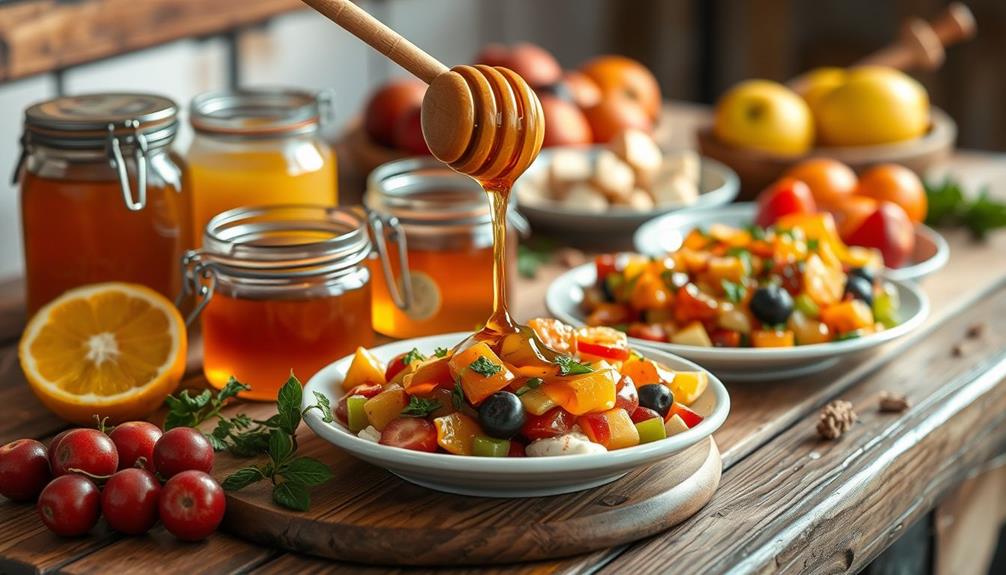
Honey brings a unique depth of flavor to a wide range of culinary creations, from savory sauces to sweet desserts. You can enhance your favorite dishes by adding honey to sauces and dressings, where it imparts a rich aroma and creamy texture. Its versatility makes it a fantastic natural sweetener in beverages and recipes, boosting both flavor and nutritional value.
Additionally, honey's numerous varieties available can further enhance the taste profiles of your dishes, allowing for endless culinary exploration.
If you're looking to preserve fruits, you can store them in honey in the refrigerator for short-term preservation. For long-term options, consider using syrup mixtures that are suitable for water bath canning. Different honey varieties have varying pH levels, which can impact the acidity of these mixtures, making it essential to choose the right type for your needs.
The culinary uses of honey date back to ancient civilizations. They valued honey not only for its sweetness but also for its ability to preserve food.
Ensuring Honey Quality
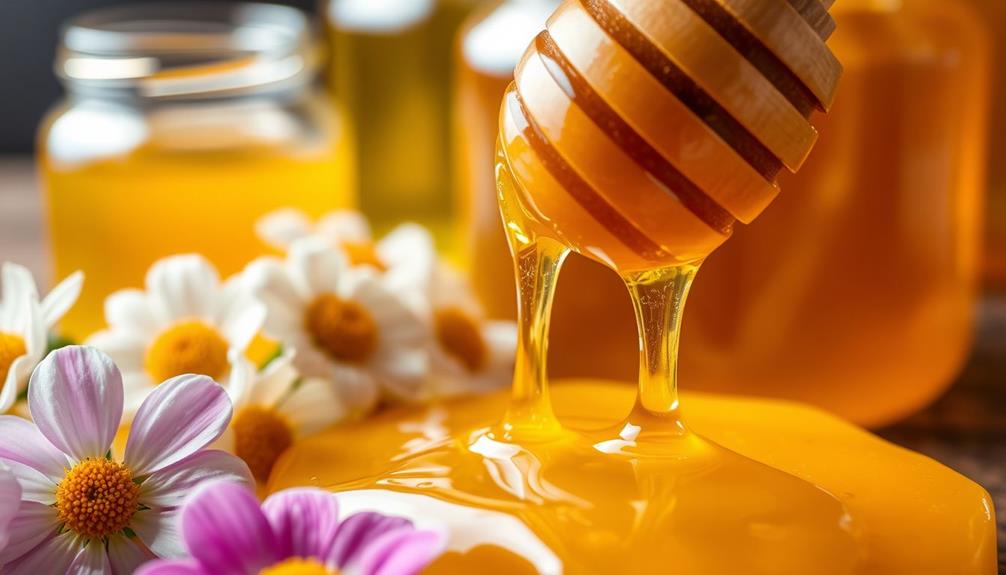
Quality matters greatly when selecting honey for its preservative properties. You should always choose pure honey, free from additives, and sourced from reliable producers. This guarantees that its natural preservative abilities remain intact.
The Honey Colony emphasizes strict quality standards, focusing on transparency in production and responsible beekeeping practices, which can guide your selection process. Additionally, understanding the importance of budgeting for quality ingredients can help you make informed decisions when purchasing honey.
Different honey varieties have varying pH levels, impacting their preservation abilities and overall acidity. This makes it vital to select high-quality honey for your culinary applications. Regular testing for factors like moisture content and sugar concentration is essential to secure honey's longevity and preservative qualities.
When shopping for honey, prioritize raw honey over processed varieties. Raw honey retains more nutrients and benefits, enhancing both flavor and preservation capabilities.
Health Benefits of Honey

The remarkable health benefits of honey make it a valued addition to any diet. As a natural source of antioxidants, honey helps boost your immune function and protects your body from oxidative stress. Its anti-inflammatory properties are effective in reducing inflammation, aiding in wound healing, and soothing sore throats when you're feeling under the weather.
Regularly consuming honey supports your digestive health by promoting the growth of beneficial gut bacteria, making digestion easier. If you struggle with colds or respiratory issues, honey has been traditionally used as a remedy, showing effectiveness in providing symptom relief and supporting recovery.
Incorporating honey into your daily routine doesn't just enhance flavor; it also contributes to overall wellness. Honey provides essential nutrients and energy, serving as a healthier alternative to refined sugars.
You can enjoy it in various forms, whether drizzled on toast or mixed into herbal teas. By choosing honey, you're not only indulging your sweet tooth but also taking a step toward a healthier lifestyle. Embrace these benefits, and let honey be a delicious ally in your journey toward better health.
Exploring Honey's Versatility
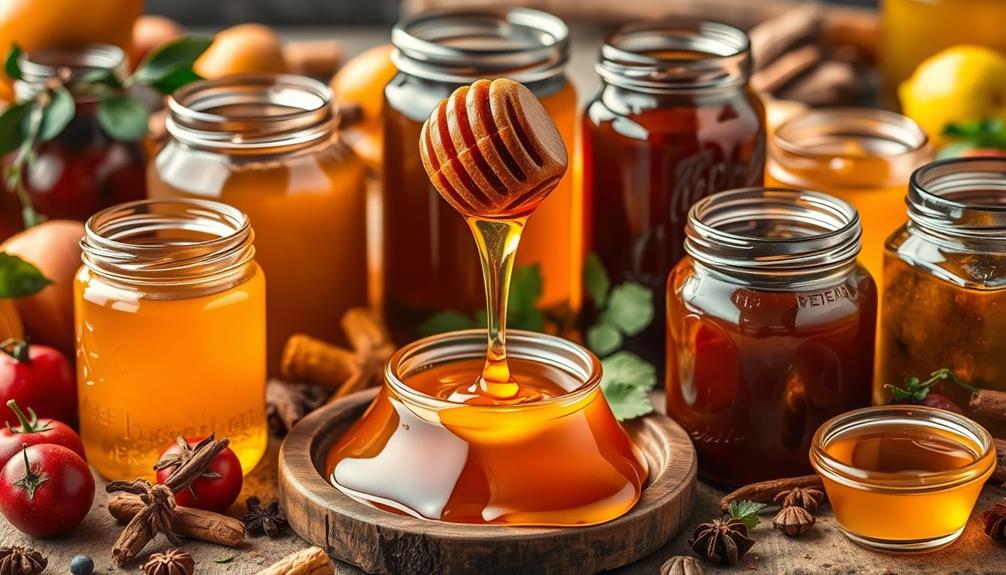
Versatility defines honey's role in the kitchen, making it an essential ingredient for both sweet and savory dishes. With its low moisture content and high sugar concentration, honey naturally preserves food by inhibiting microbial growth. This feature has made it a staple for preserving fruits and meats since ancient times. You can use honey to enhance flavors in sauces, dressings, and jams, giving your dishes a unique touch.
For short-term fruit preservation, consider storing them in honey in your refrigerator. This method not only keeps your fruits fresh but also enriches their taste.
Different honey varieties offer varying pH levels, which can impact the acidity of syrup mixtures, particularly useful in water bath canning for long-term preservation.
To achieve the finest results, focus on the quality and purity of the honey you use. High-quality, unprocessed honey free from additives guarantees peak preservation and flavor enhancement.
Frequently Asked Questions
Does Honey Contain Preservatives?
No, honey doesn't contain synthetic preservatives. Its natural properties, like low moisture and high sugar content, inhibit microbial growth. The acidity and hydrogen peroxide in honey also contribute to its preservative qualities.
Is Honey a Preservative?
Yes, honey acts as a natural preservative. Its low moisture content, high sugar levels, and acidity prevent microbial growth. You can use honey to enhance food preservation while benefiting from its unique flavor and nutritional properties.
What Is a Natural Preservative?
Ever wondered how some foods stay fresh longer? A natural preservative is a substance from nature, like vinegar or salt, that slows spoilage and inhibits microbial growth, offering a healthier alternative to synthetic options.
What Do Preservatives Do?
Preservatives inhibit spoilage by preventing the growth of harmful microorganisms and slowing down chemical reactions. They help maintain your food's freshness, flavor, and texture while extending its shelf life, ensuring you enjoy it longer.
Conclusion
In the sweet symphony of nature, honey stands out as a remarkable preservative, blending taste and longevity effortlessly. By harnessing its unique properties, you can elevate your culinary creations while ensuring health benefits that stick around. With proper quality checks, you can enjoy honey's versatility in your kitchen. So, whether you're drizzling it over a dish or using it to preserve, let honey be your golden partner in exploration and flavor.

